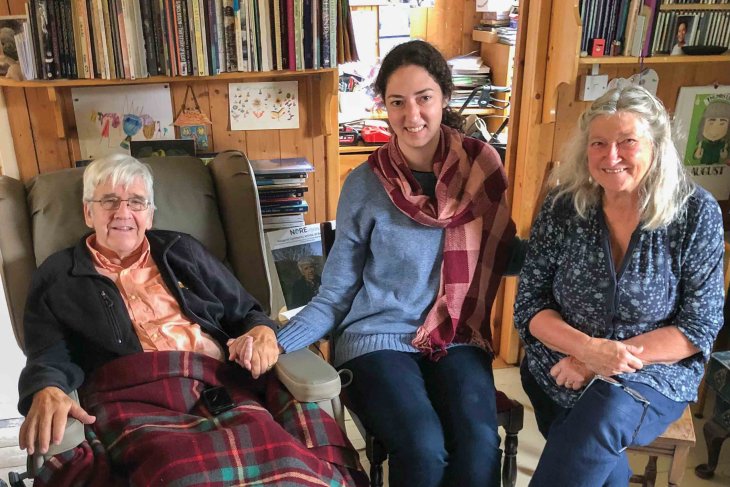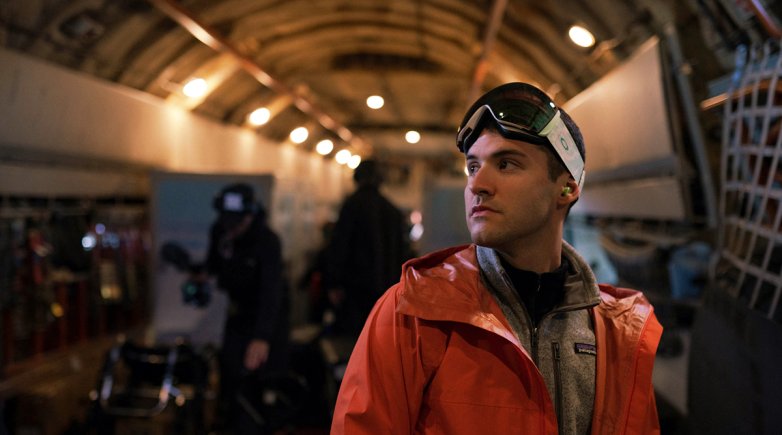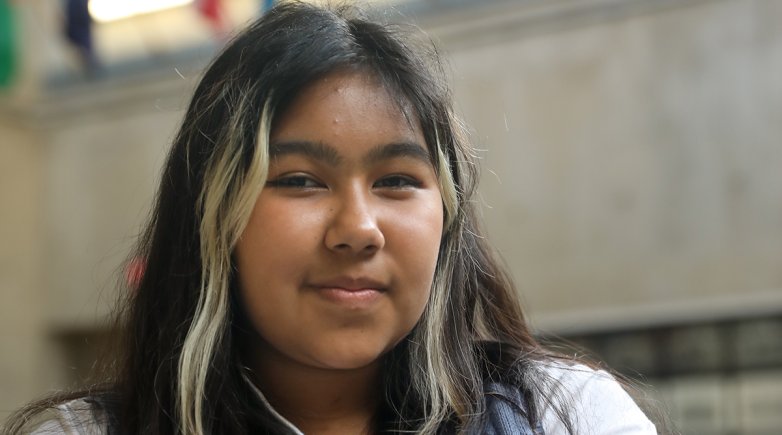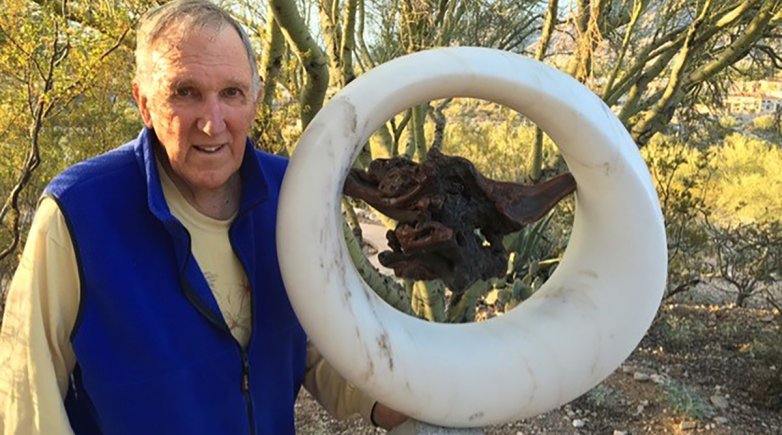Zoe Brennan-Krohn

"I learned that being smart and intellectual was one way to be with others but not the only way."
One fall morning in 2001, preoccupied with the prior night’s homework, Zoe Brennan-Krohn ’03 walked across campus for assembly. Sliding into a seat in Assembly Hall, she was reminded that assemblies did not always feel very meaningful. Often, speakers reminisced that Exeter had been the best time of their lives. Brennan-Krohn, an upper, wasn’t sure she shared that view. Exeter was complicated. She was a diligent student who stayed on top of her classwork and other commitments, but she also felt overwhelmed and homesick. It didn’t help that her friends and peers seemed to have an easier time keeping up with everything.
The speaker that morning was different. He was Patrick Lydon ’68, a recipient of the John and Elizabeth Phillips Award for his work establishing Ballytobin, a 14-acre farm and residential community in Ireland for people living with intellectual and physical disabilities. Lydon became emotional as he told stories about the children and adults who lived there, farm life and the loyal co-workers — all, like Lydon, unpaid volunteers who helped make it all work. Brennan-Krohn was struck by his fond description of a life that was chaotic and full of surprises — very different from her own, which felt more about striving and order. Lydon spoke eloquently about his view that all people should feel whole, respected and supported to find their places in the world. “Patrick presented himself with honesty, vulnerability and rawness but along with a very clear, sharp intellect and critique about society’s treatment of people with disabilities,” Brennan-Krohn recalls. “It just drew me in.”
What if, she wondered, being an academic super achiever wasn’t essential to who she was? She emailed Lydon after assembly and accepted his invitation to volunteer at Ballytobin the following summer. Her experience was so profound that she returned after graduating from Exeter and stayed for two years, postponing college.
Now the director of the ACLU Disability Rights Program, Brennan-Krohn represents deaf and hard-of-hearing prisoners in Georgia to secure services like hearing aids and sign language interpreters. She’s also an authority on legal guardianship and conservatorship. “I think a lot about how to make space for my clients in our society, no matter how troubled their lives may be,” she says. “Making that space in our hearts means being in proximity to them.”
Proximity was the point at Ballytobin. Brennan-Krohn and other volunteers lived alongside the people with disabilities, providing direct care support and also a shared life together. Prior to her arrival, she knew nothing about farming, cooking or working with people with disabilities. “There was a lot about being there that I didn’t know,” she says. “But that was accepted.”
She became adept at making pizza for Wednesday lunches and harvesting vegetables from the garden. But providing direct care support for the young people with disabilities, despite her inexperience, was the most rewarding. She grew especially close to Aiden, a teen with cerebral palsy who didn’t speak or use sign language. They communicated without words, often working on an activity or simply sitting together.
“It was such a contrast from what I thought I had to ‘be’ to succeed,” Brennan- Krohn says. “I learned that being smart and intellectual is one way to be with others but not the only way. My way of being with Aiden was completely different and undeniably real.”
Tempted to stay in Ireland, Brennan-Krohn twice deferred enrolling at Brown University. When she did return to the U.S., the transition to college was disorienting. A history major, she drew on her Ballytobin experience to write a detailed history of the community’s umbrella organization, Camphill Communities, for her senior thesis.
After graduation, Brennan-Krohn went to Bosnia on a Fulbright scholarship to teach English at the University of Banja Luka (“I stayed there for a year, then a second year,” she says. “I have this habit of staying places longer than I’m supposed to.”) She was drawn to pursue a career in public service and enrolled at Harvard Law School. At Harvard, she initially focused on international law. Between her first and second years of law school, she interned for the United Nations International Criminal Tribunal for the former Yugoslavia at The Hague, working for the president of the tribunal designed to hold people accountable for war crimes and human rights violations.
Her passion for disability rights brought her back to the U.S. and the ACLU Disability Rights Program. In her prison work, her clients are disproportionately people of color and are excluded not only from society, but also within the prison system, because of their disabilities.
“People with disabilities are overrepresented in the prison and jail system because their disabilities aren’t taken into account,” Brennan-Krohn says. “They don’t get the supports they need, which can lead them to prison or jail, where they end up staying longer because there’s still no support to help them.” She adds that getting to know her clients and gain their trust has been “incredibly rewarding.”
In 2021, when singer Britney Spears’ struggle to end her father’s control of her personal life and finances made headlines, Brennan-Krohn found an opportunity to draw attention to the issue of guardianship, a lesser-known but important disability rights issue. Legal guardianship (or conservatorship) gives a person, usually appointed by a court, the legal authority to make decisions for someone else.
“It’s literally stripping someone of their civil liberties because of their disability,” Brennan-Krohn says. Many people with disabilities get assessed by a judge at age 18 to determine if they can take care of themselves. “Most of us are still learning at 18,” Brennan-Krohn says. “How would we fare if we were put in that position?”
She filed amicus briefs supporting Spears in a California court and testified before Congress, outlining the dangers of conservatorship and presenting alternatives (including supported decision-making, which allows people with disabilities to choose who helps them make choices). Despite Spears’ wealth and fame, her experience with conservatorship was “so typical,” Brennan-Krohn says. “She got placed in conservatorship at a moment of crisis and couldn’t end it.”
Brennan-Krohn recently returned to Exeter to speak at assembly about Patrick Lydon and her experiences at Ballytobin. But the situation there has changed. Lydon, whom she remained close to, died in 2022. Ballytobin still exists but is no longer part of the Camphill Communities. Brennan-Krohn is still an achiever, but that doesn’t define who she is.
As a film crew captured her remarks for a documentary about Lydon, she reflected on his legacy. “Patrick talked about creating a space in your soul to include what can’t be included,” she says. “Making that space for people whose values are different from mine changed me.”
Editor's note: This article first appeared in the spring 2024 issue of The Exeter Bulletin.



